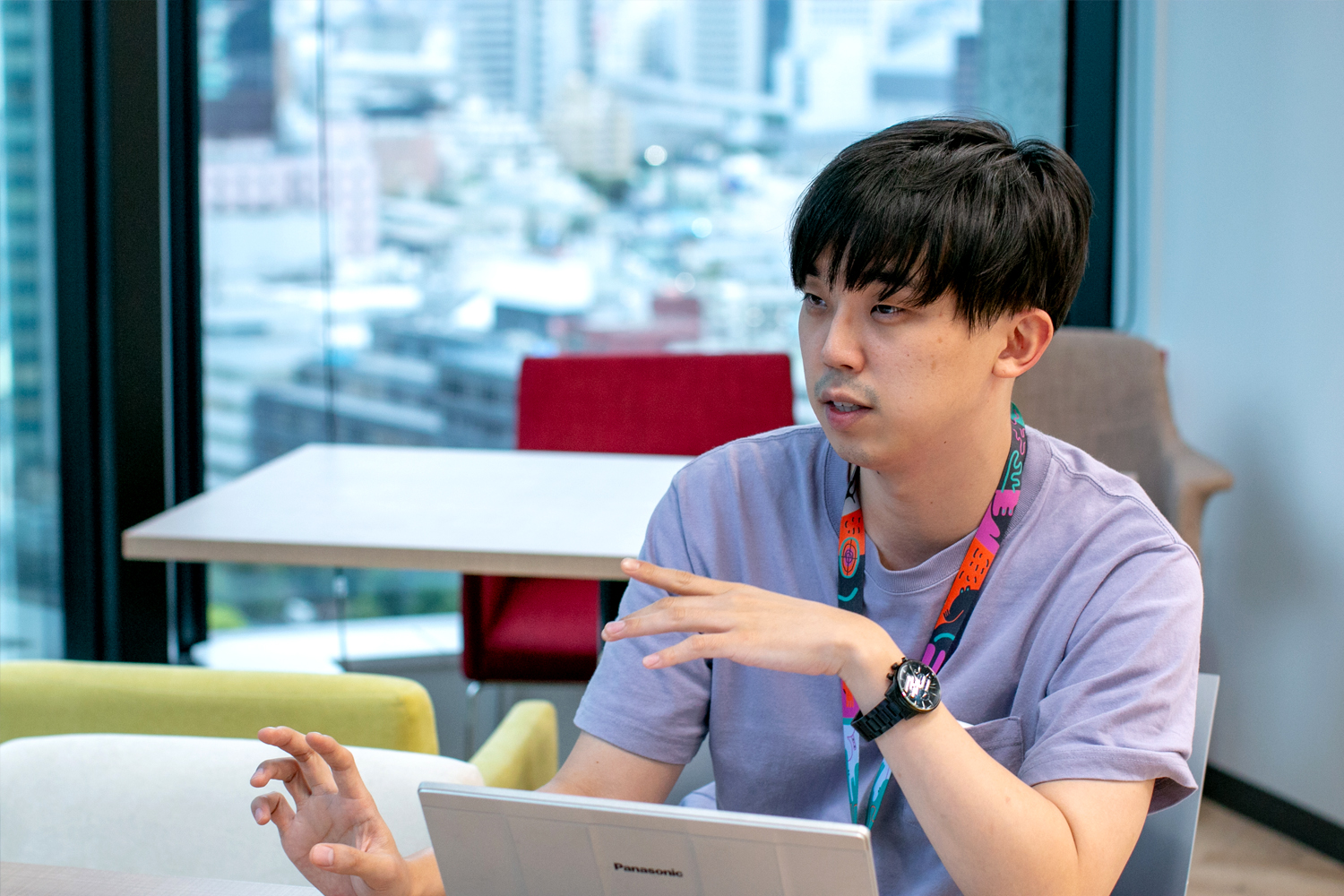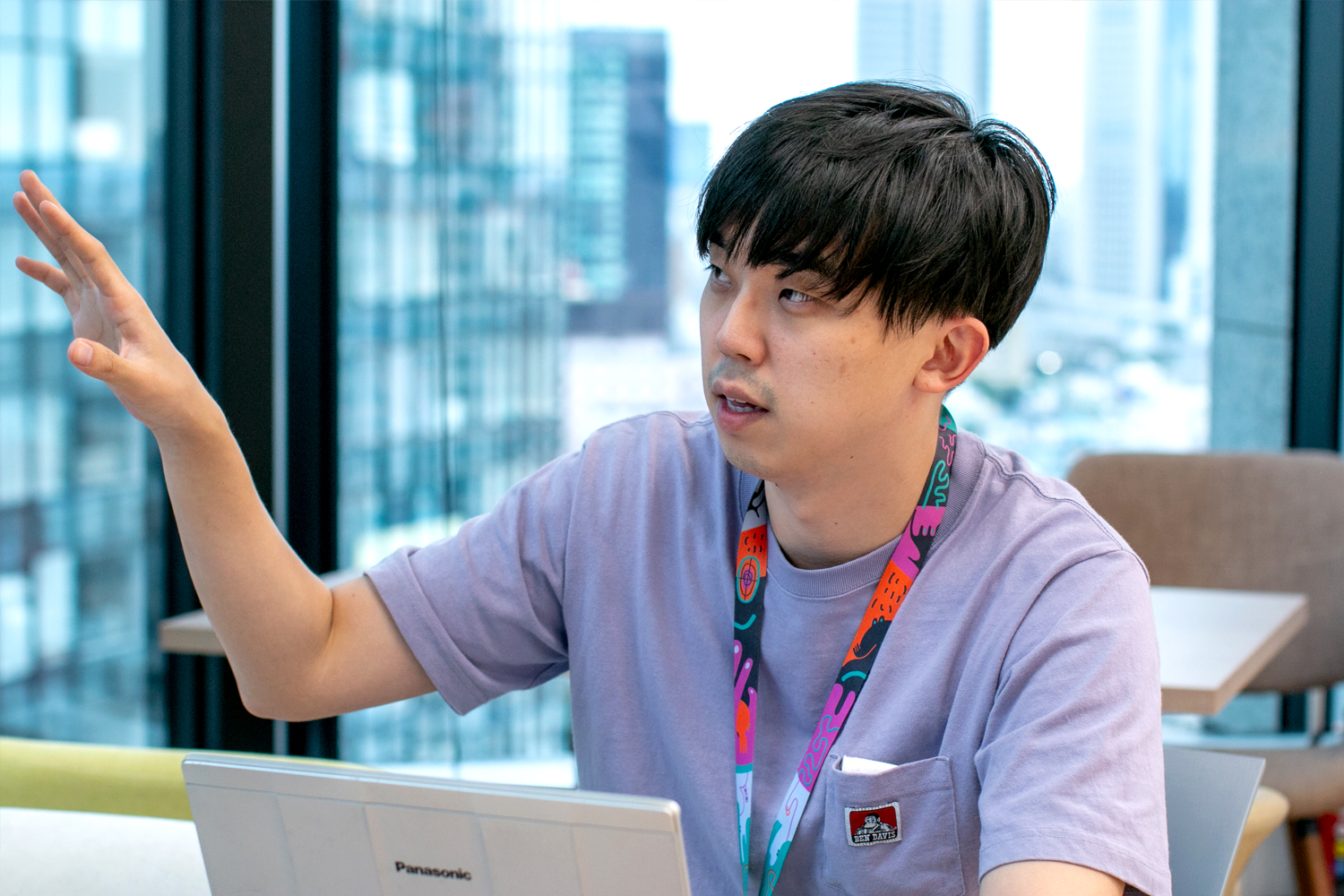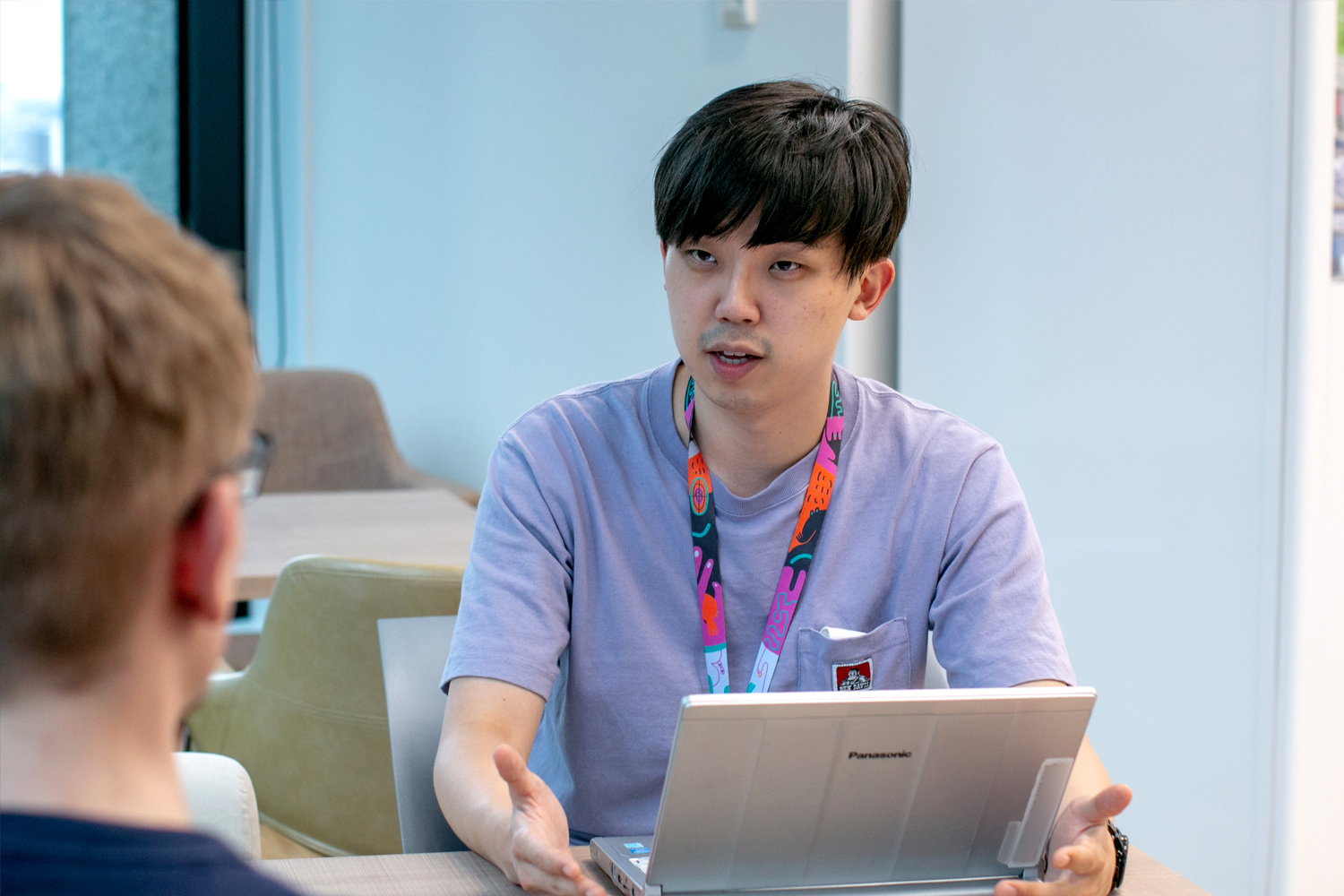Working as a Manager in Japan

by Florian
Even as a foreigner at a Japanese company, it’s possible to climb the career ladder. However, doing so requires some extra investment. We talked to Juan about his experiences as both a developer and a team manager. (※This interview was translated from Japanese.)
コンテンツ
Juan’s Profile
Name: Juan
Country: South Korea
Major: Computer Science
Industry: IT/Web
Japanese Level: N1
Work status: Full-time employee
Time in Japan: 5 years
Florian: First, please introduce yourself.
Juan: My name is Juan Lee. I’m from Seoul, South Korea. I came to Japan in 2015 and have been working as a web engineer for about five and a half years now. My main tasks are web app development and website creation.
The way to Japan
F: What was your reason for coming to Japan?
J: When I was still in university, I was thinking about my future and what kind of work I wanted to to. I wanted a high salary paired with a good working environment. Compared to Korea, the salary for web engineers is higher in Japan and I thought the working environment was better too, so I decided to go to Japan.
F: How did you find your job?
J: It was introduced to me by a job search agent, through my university.
F: Did you already know Japanese by that time?
J: Kind of. I decided that I wanted to move here when I was in my second year at university, so I studied between 2 and 3 years before starting to work in Japan. But even then, my speaking skills were very low.
F: What level were you on back then?
J: My overall Japanese level … I think I was slightly above N5? (laughs) We also use kanji in South Korea so I had a bit of a head start in that regard compared to other foreigners, but I couldn’t talk to people at all.
F: How did you communicate with your co-workers?
J: Well, I had quite a few Korean coworkers, so I asked them for help. Whenever I was told something I didn’t understand, I talked to them about it during break time. They translated for me, and I was like “ahh, so that’s what that is…” But I also had Japanese members from my team help me with studying. Basically, I learned Japanese while working.
Working as a developer and a manager
F: So you’re working as a web engineer now. Can you tell me a bit more about what you do, in detail?
J: I’m doing regular web engineer work, but I’m also in a managerial position … I lead a team of people that create websites. So usually, my work is split between web app development and team management. And in addition to that, there are some other miscellaneous tasks. For example, I’m often involved when we’re planning internal events or participate in projects aimed at the solution of internal problems. For example, we make and maintain online manuals so the other employees can easily reference the correct way to do everyday tasks.
F: There are lots of different kinds of web applications… can you give me some example of whatkinds of apps you’re developing?
J: I mostly create things like member registration systems and inquiry delivery systems. I do that both internally and for clients. When working for clients, we first talk to them about what they’re envisioning, then define the requirements, and then develop the actual thing … but sometimes, we also do the whole system for the client, not just individual parts.
F: Outside the realm of foreign-owned companies, I think it’s pretty rare for to see non-Japanese people in managerial positions. How did you get there?
J: I guess you could say I did my work well? When you’re doing all your daily tasks and you’re quick enough, you sometimes have time left over. And when that started happening for me, I thought about whether there was something else I could do, if there were any proposals that I could make … not only things that concerned me personally but other members of the team or people I was working with. I wanted to make the working environment better for everyone. But as a regular employee, your options are limited, so I thought that if I wanted to do more, I should strive for a higher position.
F: So some day you just got informed that you had been promoted? Were you surprised?
J: We have two big company events each year, where promotions are announced on a grand scale. You’re not informed about it in advance. In my case, I was surprised, but I was also kind of expecting it.
F: You’ve been at the same company for a few years now. In which moments do you most made feel personal growth, or give you the feeling that you contributed?
J: Right now I’m leading a team of website creators. In the past, I’ve created workflows for the coding team or implemented new development environments to make work more efficient and productive. I was successful with that, to the point that the results were even better than I had anticipated. I think there are all sorts of uncomfortable things hidden in our everyday working environment, and if you can get rid of some of them, everyone’s output increases. So it’s instances like those that satisfy me most and make me think that I did my part.
Thoughts about working Japan as a foreigner
F: At your current company, there’s at least one non-Japanese person in any given team. What do you think is most important when working in a global environment?
J: Communication is everything. We’re using Japanese as our main language, and sometimes some foreign employees can’t speak Japanese well or don’t quite understand what is being said … that’s sometimes true for me, even now. From a team management perspective, it’s important to think about work under the pretense that these kinds of employees exist and have to be included like everyone else.
F: On the internet, you often read that Japanese isn’t required for developer or IT engineer positions. How do you think about that, based on your own experiences?
J: Well, it depends on the company … but not knowing Japanese puts limits on what you can do. Without it, you’ll basically be a robot who can’t really work on his own unless there’s someone that knows English around. But when you know Japanese, you can search for all kinds of work, actually talk with your coworkers, ask them questions directly … you don’t have to “go through” anybody. That’s the main thing, in my opinion.
F: You probably wouldn’t have gotten your current position if you hadn’t learned Japanese, right?
J: There would’ve been no way for me to do that. A manager, by definition, is someone who supervises people, and in my case, most of those people are Japanese. If I couldn’t speak Japanese, I couldn’t delegate tasks, solve problems within the team, and so on…
To sum it up: Yes, you can do IT work even without knowing Japanese … there’s lots of work that wants to be done. But in that case, you’ll be a programmer in quite the literal sense. You’ll have a specifications document, and work through it from top to bottom … that sort of thing.
F: When searching in English about working in Japan as a foreigner, a common piece of advice you see is that non-Japanese people are expected to contribute with their “outsider’s perspective.” What do you think about this?
J: I think you can bring in your “outsider’s perspective” in two different ways. First, you can address things directly. For example, if you have doubts or questions about something, I think it’s easier to ask or ask about it if you’re not Japanese. Foreigners going ahead and clearly expressing their opinions can lead to the creation of an environment where everyone else can do the same.
The second thing is … I think in other countries, employees tend to take more responsibility for their work. In Japan, responsibility is sometimes shifted to the team or the supervisor … and because of that, you can easily fall into the trap of thinking that someone else will take care of the ramifications of your mistakes. But I think this stance of fully standing behind your work is really cool. Of course, there are instances where you might not be able to do that, but for me, what counts is the spirit, Once you start thinking along the lines of “eh, someone else will take care of that…” your work starts to become really sloppy. I think having a strong sense of responsibility toward your work is very important.
F: … and by demonstrating that spirit, foreigners can positively influence their environment?
J: Yes. People who are in the same projects as them, for example. It’s most effective when people can see you directly.
Job search advice
F: Is there any advice you’d give to someone who wants to work in Japan?
J: There are a lot of young people that focus on their personal growth. If you interviewed 100 people, I think about 95 of them would tell you that – “I want to improve myself, I want to do what I love…” But the really important part is coupling your own vision with everyday work at the company or the company’s future. A lot of students don’t think about this.
While I think that you can be successful by just doing what you love, in my opinion, it’s better to gather experience in a lot of different areas. Another important thing is producing results, and doing your best to do so. You always have to keep the relationship between the company and you in mind – they’re paying you, and you’re a contributor. You might not 100% like everything, but it’s your job to contribute. That’s also why linking your personal vision with the company’s goals is so important.
F: That sounds very “managerial”… (laughs) I’d like to ask you for one more piece of advice. Are there any programming languages that you’d recommend to people who are thinking about working as a developer or programmer in Japan?
J: In case you don’t know anything about programming yet, I’d recommend starting with the basics at HTML and CSS, then moving on to JavaScript … and maybe PHP, if you have time left. For people who already know these, I’d probably recommend Python. AI is getting really popular lately, and you can apply it in other fields as well. So if you have knowledge and skills in that field, you can apply them here in Japan without any problems.
F: PHP … I remember reading somewherethat PHP is used a lot more in Japan than elsewhere.
J: Yes, that’s true. Most work is PHP-based.
F: Is it because company-internal systems tend to be older?
J: It’s not because PHP is old. It’s easy to learn, and its performance is good as well. Somehow there’s this perception of PHP being old and bad, but I think people who say that don’t really know PHP (laughs) They’re being ignorant. Whenever I hear that kind of talk, I just move on. If you start asking questions, they probably can’t answer properly anyway. So I simply reply “Is that so…” and change the topic.
F: When reading about programming languages here and there, I had picked up on these opinions. “PHP is outdated, there’s no point in learning it anymore…” I pretty much don’t know anything about this topic, so I was wondering whether that was true … but I see, that’s how a developer who works with PHP looks at it.
Plans for the future
F: So you’re in a middle management position now, but how about the future? Is there anything specific that you’d like to do or any goal you want to reach?
J: I want to become an authority in the web field. When I say something, I want my words to have weight, and be recognized as someone worth listening to. I think that if I accumulate enough knowledge and skills to get to that stage, I can make a lot of things work more smoothly.
Now, as a manager, the scope of things that I’m able to do is wider than back when I was a regular employee. But once you get to the “authority” stage, you have even more options. Your words reach more people, your influence grows… There are a lot of things around us that are kind of inconvenient, and I’d like to be able to change them through engineering… not just within my own company, but in society in general as well.
Any questions?
Interested in working as a web marketer in Japan and still have questions? Ask away in the comments! We’ll check back with Juan and give you some advice about how to prepare and find a job. For more info about Juan’s company, read our article on it over here or check out the recruitment sites (*in Japanese) directly by clicking the buttons below.
You want to work in Japan?
Find out how others got their jobs!
■ Online Application and the Apparel Industry, Clemence from France
■ Teamwork and Lifelong Learning, Woojin from South Korea
■ Talking to clients in Japanese, Viktoryia from Belarus
■ More job-hunting advice from your Senpai
Recommended Posts

How to Get Along with Your Japanese Boss
25 5月 2021 - Work, Working Culture

The 10 Most Popular Japanese Companies in 2021
19 5月 2021 - Work






